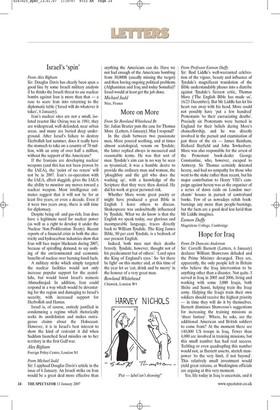More on More
From Sir Rowland Whitehead Bt Sir: Julian Brazier puts the case for Thomas More (Letters, 6 January). May I respond?
In the clash between two passionate men, More poured seething, and at times almost scatological, venom on Tyndale; the latter replied always in measured and reasonable terms. He was that sort of man. Tyndale's aim can in no way be seen as tyrannical; it was a humble desire to provide the ordinary man and woman, the 'ploughboy and the girl who does the washing up', with a knowledge of the Scripture that they were then denied. He did his work at great personal risk.
Whether More wrote great poetry or might have produced a great Bible in English I leave others to discuss. Shakespeare was undoubtedly influenced by Tyndale. What we do know is that the English we speak today, our glorious and incomparable language, traces directly back to William Tyndale. The King James Bible, 80 per cent Tyndale, is a bedrock of our present English.
Indeed, both men met their deaths bravely. Tyndale, however, thought not of his predicament but of others'. 'Lord open the King of England's eyes.' So 'let there be light' on this matter and, at this time of the year let us 'eat, drink and be merry' in the honour of a very great man.
Rowland Whitehead Chiswick, London W4 From Professor Eamon Duffy Sir: Rod Liddle's well-warranted celebration of the vigour, beauty and influence of Tyndale's magnificent translation of the Bible understandably phases into a diatribe against Tyndale's fiercest critic, Thomas More (The English Bible has made us', 16/23 December). But Mr Liddle has let his heart run away with his head. More could not possibly have 'put a few hundred' Protestants 'to their excruciating deaths'. Precisely six Protestants were burned in England for their beliefs during More's chancellorship, and he was directly involved in the pursuit and examination of just three of the six — James Bainham, Richard Bayfield and John Tewkesbury. More was also responsible for the arrest of the Protestant book-dealer George Constantine, who, however, escaped to Antwerp. Sir Thomas certainly detested heresy, and had no sympathy for those who went to the stake rather than recant, but his major contribution to Henry VIII's campaign against heresy was as the organiser of a series of dawn raids on London merchants' houses in pursuit of contraband books. Few of us nowadays relish bookburnings any more than people-burnings, but the facts are a good deal less lurid than Mr Liddle imagines.
Eamon Duffy Magdalene College, Cambridge






















































 Previous page
Previous page